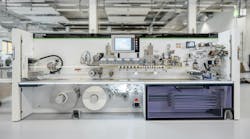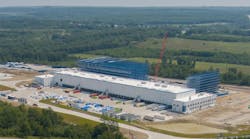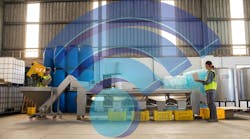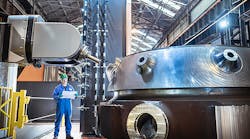Sheffield Forgemasters Intl. Ltd. was awarded £8 million ($10.5 million) for its part of a U.K. government-sponsored research program, exploring industrialization of electron-beam welding (EBW) for civil nuclear assemblies. The open-die forging, metalcasting, and engineering group noted this is the largest R&D project it has ever undertaken.
“We aim to demonstrate how EBW can improve material characteristics over traditional welding, which heats up a larger volume of material, but also how this technology can integrate at manufacture to remove component weld properties at a later stage," explained Jesus Talamantes-Silva, research, design and technology director at SFIL.
Electron-beam welding (EBW) is a fusion welding process in which a beam of high-velocity electrons is applied to two materials to be joined. At the site of the joint, workpiece materials fuse together as kinetic energy of the electrons converts into heat on contact.
“Using EBW over traditional welding techniques, circumferential welding of pressure vessels can be reduced from approximately 150 days to 10 days. Through the science that we have already refined, we will be able to produce safer, stronger components for the next generation of nuclear power, with lower costs and vastly reduced production times.”
Sheffield Forgemasters' research is part of the U.K. Dept. of Business, Energy, and Industrial Strategy's Nuclear Innovation Programme, and represents the largest grant within the £20-million ($26.3-million) project.
SFIL will install an EBW system capable of welding 3.0-m -diameter cylinders under localized vacuum, and without traditional welding preparation, to achieve narrower welds than traditional methods. It also aims to integrate the EBW sequence as part of the manufacturing process, prior to heat-treatment.
Other participants in the research program include the Rolls-Royce Civil Nuclear and Rolls-Royce (Submarines) businesses, Cavendish Nuclear, the U.K. Ministry of Defence, and the U.K. Atomic Energy Authority, among other academic and engineering bodies.
"It is our largest research project to date, which launched in August, running until March 2021, and the implications of accelerating this technology for civil nuclear power are significant, but could also benefit other sectors including defense, offshore, and petrochemical industries," according to Talamantes-Silva.










